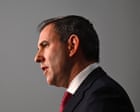Jim Chalmers says Labor has a “responsibility” to move beyond its election mandate as he argues the nation’s future prosperity depends on designing an ambitious agenda centred on creating a more productive economy and tax reform.
In a speech at the National Press Club in Canberra, the treasurer said a three-day reform roundtable from 19 August would be “a genuine attempt to find common ground if it exists, in the service of our shared national economic interest”.
Chalmers recognised the need to “lower” the tax burden on Australian workers and said the country needed to prepare for a day when fossil fuel profits were no longer a major source of federal revenue.
Sign up for Guardian Australia’s breaking news email
As he criticised the “cancerous” effect of the media’s “rule-in rule-out game” when it came to making the case for change, Chalmers said “no sensible progress can be made onproductivity, resilience or budget sustainability without proper consideration of more tax reform”.
“I don’t just accept that, I welcome it.”
He said tax reform was “bigger than just managing the difficult balance between spending and collecting”.
“It’s also about lifting productivity and investment. Lowering the personal tax burden and increasing the rewards from work. Creating a more sustainable, simpler system to fund vital services. And improving intergenerational equity.”
The government was collecting less tax as a share of the economy than under John Howard and Peter Costello, he said, signalling there was historical precedent for a larger tax take.
But he also pointed to a need to address structural challenges such as an ageing population and a future where fossil fuel exports are not as lucrative.
“The global net zero transition will also reshape our revenue from resources,” he said.
“This evolution in our revenue base is one of the reasons tax reform is so crucial to budget sustainability – on top of restraining spending, finding savings and working on longer-term spending pressures.”
Sign up toAfternoon Update
Our Australian afternoon update breaks down the key stories of the day, telling you what’s happening and why it matters
after newsletter promotion
Experts have long criticised a lack of ambition among political leaders to prosecute sweeping reforms but Chalmers said it was just up to the government of the day to make the case for change, but a “collective responsibility”.
“Reform is not just a test of a treasurer or a cabinet but a test of our country,” he said.
Amidfierce criticismof Labor’s modest changes to concessions on earnings for the biggest superannuation balances, Chalmers accused some of demanding tax reform at one moment, while standing in the way of any steps in that direction.
“Too often, the loudest calls for economic reform in the abstract come from the noisiest opponents of actual reform in the specific,” he said.
Chalmers called out the media’s role in creating an environment “conducive” to brave policymaking, especially the “rule-in-rule-out game”.
“Of course there are things no sensible government will contemplate, but limiting ourselves to ruling things in or out forever has a cancerous effect on policy debates,” he said.
“It can rob an informed and modern country like ours the flexibility and maturity to respond to big challenges.”
